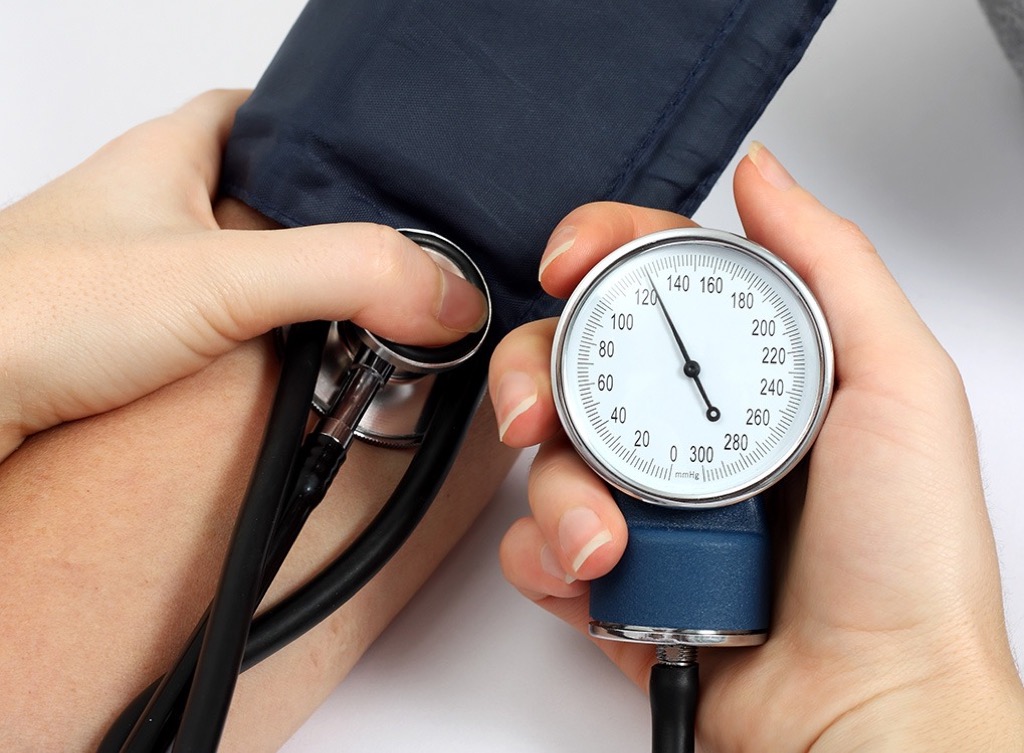Even though it seems like heart problems occur randomly throughout the year, that’s not the case. According to some of the country’s top cardiologists, there are certain times that are more dangerous than others. We’ve rounded up the times of year you need to pay most attention to your body’s most essential organ—and which issues you need to be most aware of when. Cold weather during the winter months is dangerous for your heart—we’ll get to that shortly—but those blazing hot temps that come about during sunny summer days can cause problems, too. “During high temperatures, the heart must work harder as it tries to cool the skin. It pumps up to four times as much blood per minute as it would on a cold day,” says cardiologist Kimberly Parks, MD, assistant professor of medicine at Harvard Medical School and medical director of Synergy Private Health. That means “your blood pressure drops and your heart rate increases, both leading to increased stress on the coronary arteries—the blood vessels of the heart—and therefore increased risk of a heart attack.” Another issue to be aware of? Heatstroke, which can temporarily or permanently damage the heart, kidneys, liver, lungs, and brain. And if you have heart disease, your risk is increased. “When external temperatures rise, the heart has to work harder to pump blood to the skin, so that sweating can occur. Sweating, of course, helps cool the body. But if the body can’t cool itself sufficiently, it can put a strain on the heart and other organs,” says cardiologist Arthur Agatston, MD. “People with underlying heart disease may be at more risk for heatstroke because they aren’t as efficient at cooling themselves down.” And for more advice on keeping your heart in good shape, avoid these 27 Daily Habits That Are Ruining Your Heart.
Winter is a magical time filled with sleigh rides, snow falls, mistletoe—and, according to 2018 research published in JAMA Cardiology, heart attacks. One of the most common reasons for this is the combination of colder weather, which constricts the blood vessels, and an increase in physical exertion from one of the most common seasonal chores. “Cold weather may increase the risk of heart attacks because the blood vessels constrict, and blood may clot more easily,” says Agatston. “But there’s also a risk that people who are normally very sedentary are pushed to do strenuous work, like shoveling snow. This sudden increase in physical exertion can put a strain on the heart and cause a heart attack.” For safety’s sake, hire someone else for the job if it feels like it’s outside of your wheelhouse. And for more tips on staving off heart attacks, discover 30 Ways to Lower Your Heart Attack Risk You Didn’t Know About.
While cold weather and physical exertion can cause health problems, there’s another reason why there’s typically an increase in heart attacks during the winter months: holiday stress. According to a 2018 study published in the journal BMJ, heart attacks increase during the winter holidays and your highest risk is on Christmas Eve. Not exactly the gift you were hoping for, huh? “It takes years for plaque to develop in the coronary arteries, which supply the heart muscle with blood, and this process is accelerated if you have diabetes, high cholesterol, high blood pressure, and/or smoking history. It’s physical or emotional stress, however, that makes your heart start pounding, which in turn causes a coronary plaque to burst open, clot over, and deprive part of the heart muscle of blood—an event known as a heart attack,” says cardiologist Christopher Kelly, MD, co-author of Am I Dying?!: A Complete Guide to Your Symptoms and What to Do Next. “The winter holidays tend to be a more stressful time, since they involve visiting family members (including ones you don’t like), traveling, preparing for parties, and drinking alcohol,” Kelly adds. “People with coronary heart disease are therefore more likely to experience heart attacks during this time.”
Common illnesses, such as the flu, don’t just make you feel lousy—they can also negatively impact your heart. “During the winter months—with the overlap of influenza and other viral illnesses that can worsen heart problems—there is a higher rate of heart failure,” says cardiologist Larry Allen, MD, medical director of Advanced Heart Failure at UCHealth University of Colorado Hospital. In fact, one 2018 study published in the New England Journal of Medicine found that people are six times more likely to have a heart attack during the week after being diagnosed with the flu compared to the year before or after the infection. “There’s inflammation going on, and your body is under a lot of stress,” study author Jeff Kwong, MD, told NPR. Those changes “can lead to an increased risk of forming blood clots in the vessels that serve your heart,” he said. Of course, there’s now also evidence that coronavirus can have a serious impact on your heart health, so that’s all the more reason to do whatever you can to stay healthy. Not only are there times of year when your heart attack risk increases, but also times of day. “Heart attacks occur at a somewhat higher frequency on a Monday and between the hours of 4 a.m. to 10 a.m., when cortisol and adrenaline levels are higher,” says Allen. What’s more, one 2011 study published in the journal Heart found that heart attacks that take place between 6 a.m. and noon were more destructive than other types. They resulted in 20 percent more dead heart tissue than episodes that happened later in the day. And for more useful information delivered straight to your inbox, sign up for our daily newsletter. ae0fcc31ae342fd3a1346ebb1f342fcb While your risk for heart problems can increase depending on the time of the year, there are plenty of different ways you can take care of your heart every day to ensure you keep the muscle strong and in proper working condition.
Even though you might love foods that contain saturated fat, trans fats, and sodium, your heart doesn’t. According to the American Heart Association, you should focus on a plant-forward diet filled with fruits and vegetables, whole grains, and nuts and legumes. And for more habits to cut out, check out these 20 Ways You Didn’t Realize You’re Ruining Your Heart.
According to the American Heart Association, you’re supposed to get at least 150 minutes of moderate intensity exercise a week. But before you get going, Kelly recommends speaking to your doctor. “If you’re over 40 years old and plan to begin a rigorous exercise program, ask your doctor if a stress test may be appropriate to ensure your body can handle the physical exertion,” he says. Also, be careful about when you exercise. “Avoid vigorous physical activity during extreme heat, especially if you have a known heart condition,” Parks says. That way, trying to stay fit and healthy won’t backfire and do more harm than good. And for more ways to improve your heart health, try The 50 Best 5-Minute Exercises Anyone Can Do. Yeah, yeah—you’ve been told to get your flu shot a billion times. Don’t just do it to fight off the virus, though—do it for your heart. “A flu shot in the late fall or early winter is recommended,” says Allen. That way you won’t have to spend a week bunked down at home feeling lousy as ever or put yourself at risk of a more serious medical condition.
Aside from staying active, keeping your weight down, and not smoking, Agatston also recommends learning about your risk early and taking the proper steps to make sure your health is in good standing. “We believe in preventative testing, like knowing your coronary calcium score and insulin levels,” he says. “By learning about your cardiac risk at a young age, you can make changes to prevent atherosclerotic plaques from forming in the blood vessels.”
If you’re not regularly being screened, now’s the time to make sure you’re going to all your doctor’s appointments. By doing so, your doctor can give you the tools you need to keep your heart healthy and catch anything that looks off. “Make sure you’ve been screened for high blood pressure and high cholesterol, and that you’re taking medication to treat these if needed. If you have diabetes, work closely with your doctor to keep your blood sugar under control,” Kelly says. “If you have a strong family history of heart disease, ask your doctor if you should take a cholesterol-lowering medicine known as a statin to reduce your risk of a heart attack. In borderline cases, a calcium scan of the heart can help inform the decision whether to take these medications.”
When you’re dealing with hot weather, keep your heart healthy by staying as hydrated as possible. “Avoid caffeine and alcohol, both of which can contribute to dehydration,” Parks says. “Also eat lots of cold foods—such as fruits and vegetables—that are high in water and important nutrients, which both get lost during sweating.”
Since having pent-up stress—whether from the holidays or living through a pandemic—can up your chances of having a heart attack, Kelly says it’s key to start trying to calm your body the best you can. “Try to find ways to control and cope with stress in your life. If you don’t, it might kill you,” he says. “Common strategies include deep breathing, meditation, and talk therapy. It also helps to simply identify the issues that produce stress and find concrete, short-term ways to address each of them.” With some small lifestyle changes, you and your heart will be feeling top-notch for years to come.













